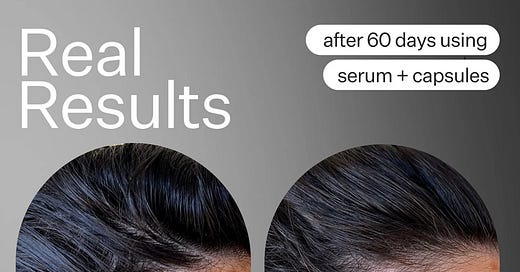Ah, holiday gift guide season — that time of year when the individualistic project of click-to-buy consumerism bundles up in the warm cloak of generosity!
By which I mean: Gift guides1 ostensibly emphasize relational values — the desire to show appreciation for the people in your life through thoughtful presents — but in reality, indicate a level of social isolation. Do you really need a content creator’s advice on what to buy your best friend? Wouldn’t the time it takes to sift through a list of curated links be better spent on the phone with the person you’re shopping for? The idea that some stranger could have valuable insight into what my mother wants for Christmas seems absurd. I know her better than I know myself!
I assume most people feel this way, and gift guides are vehicles for voyeurism or self-gifting more than anything else. At least, that’s my hope whenever I come across a beauty-themed holiday roundup — likeVogue’s, which suggests a “four-piece smoothing and firming eye set” that “provides an immediate resculpting of the eye contours” will “dazzle any recipient.” (As I found in a survey a few years ago, such a gift would more likely insult any recipient.) Or Allure’s, which recommends the Act + Acre Advanced Fuller Hair System for the “hard-to-please mom.” (I promise, pointing out your mother’s thinning hair will not please her.)
And then there’s Steiger Facial Plastic Surgery, which claims to have “something to pamper everyone … from luscious lip flips to BRO-tox.” In my opinion, any gift that implies the giftee’s face requires professional intervention is neither “pampering” nor appropriate. It’s rude! Even if someone explicitly asks for it, these insecurities should not be indulged in the form of a gift. (Give your thin-lipped loved one a card full of cash instead.)
I was asked to participate in some holiday gift guides this year and I contributed to just one, from passerby. I offered the same idea I do every year:
“May I suggest gently guiding the skincare enthusiast in your life away from beauty products and toward beauty science (a much more fun and fulfilling field of study, in my humble opinion)? Gift them a copy of Clean: The New Science of Skin and the Beauty of Doing Less by Dr. James Hamblin. In it, Hamblin goes deep on the religious, social, and scientific history of "cleanliness" and educates readers on the function of the skin itself, rather than the function of skincare products. Spoiler alert: the latter often contradicts the former, to the detriment of the skin and the delight of the skincare industry!”
Actually, I think the only acceptable beauty gift is beauty-critical reading material2. (Think of it as plumping serum for the brain.) I’ve noted some favorites here and here, and — in the tradition of using gift guides for personal shopping — just purchased Ugliness: The Non-beautiful in Art and Theory by Andrei Pop and Mechtild Widrich, which was
’s holiday suggestion for “your spoiled little sister.”For more on the cult of gift guides, check out “Here's What Happens When You Buy from a Gift Guide” by Emilia Petrarca, “A Brief Theory of the Modern Gift Guide” by Anne Helen Petersen, “Possessions as Persona: How Gifts Guide Our Identity” by Brendon Holder, “The rise of the gift-guide industrial complex” by Caitlin Dewey, and “The Gift Guides Made Me Do It!” from
.In that vein, a subscription to this very newsletter makes a fine gift too (for yourself or someone else). Here’s a testimonial from a reader who re-upped their gift subscription last week: “I was gifted a free month of subscription to The Review of Beauty … and I not only felt intellectually and culturally stimulated by your content and prose, but smarter and more in-tune with the world as a young woman. A truly worthy Substack to pay for and my first!” The gift of intellectual stimulation > the gift of hair follicle stimulation, no?





It is quite comical to think about how most people would react to these “beauty” gifts. They’re rude gifts! 🤣
“A plumping serum for the brain” ❤️